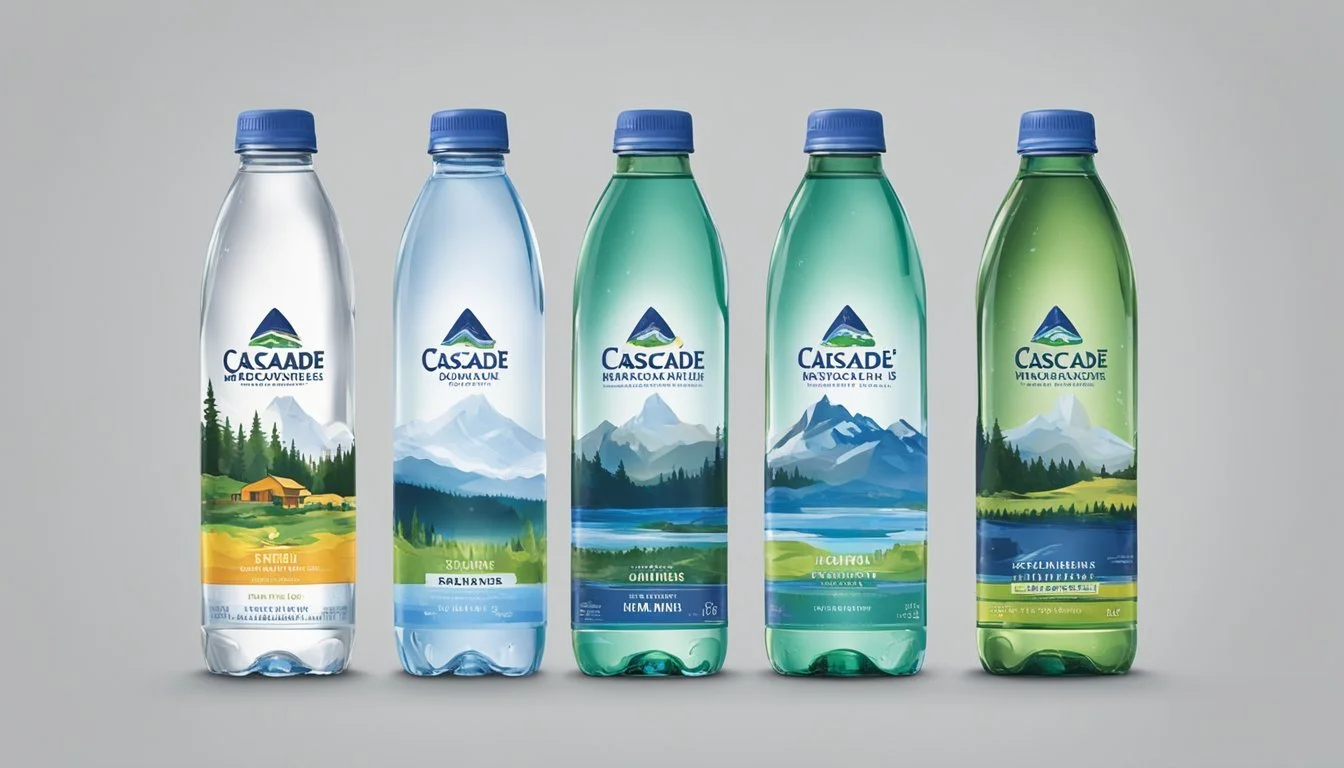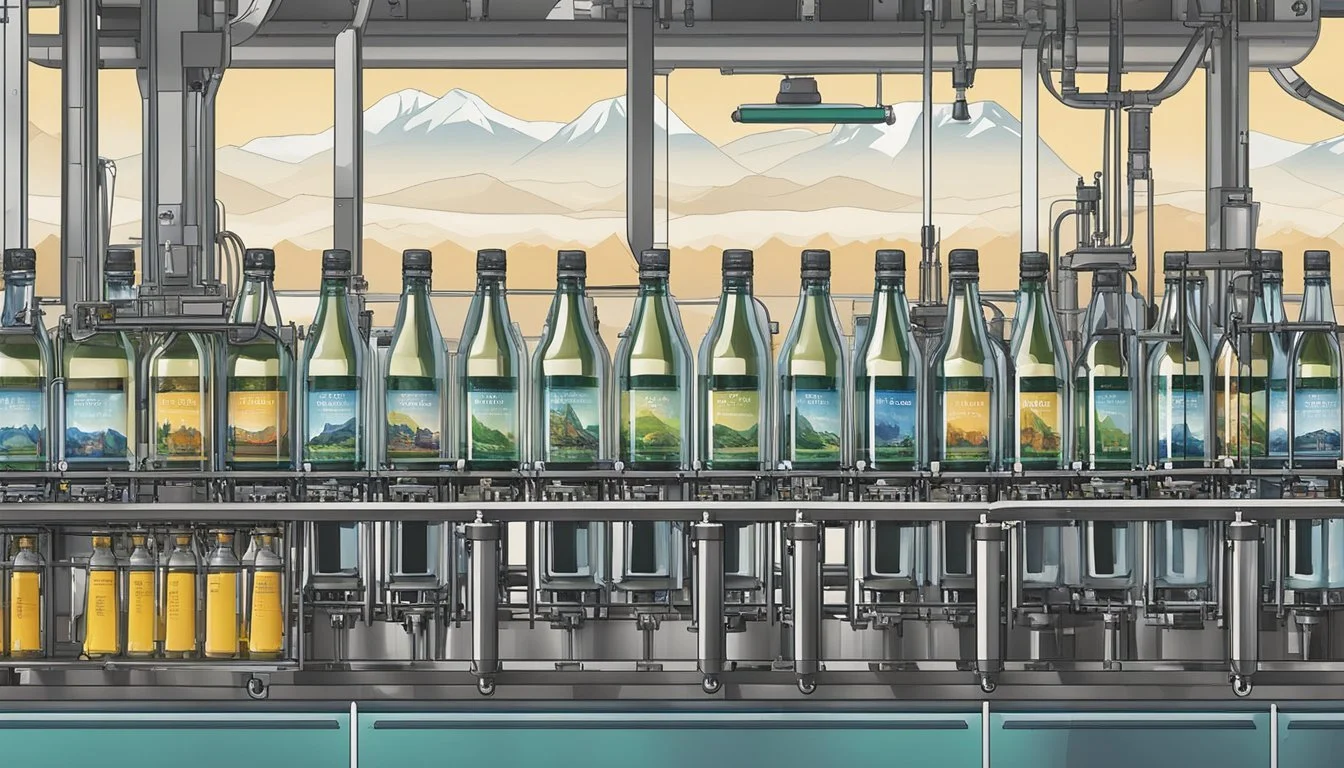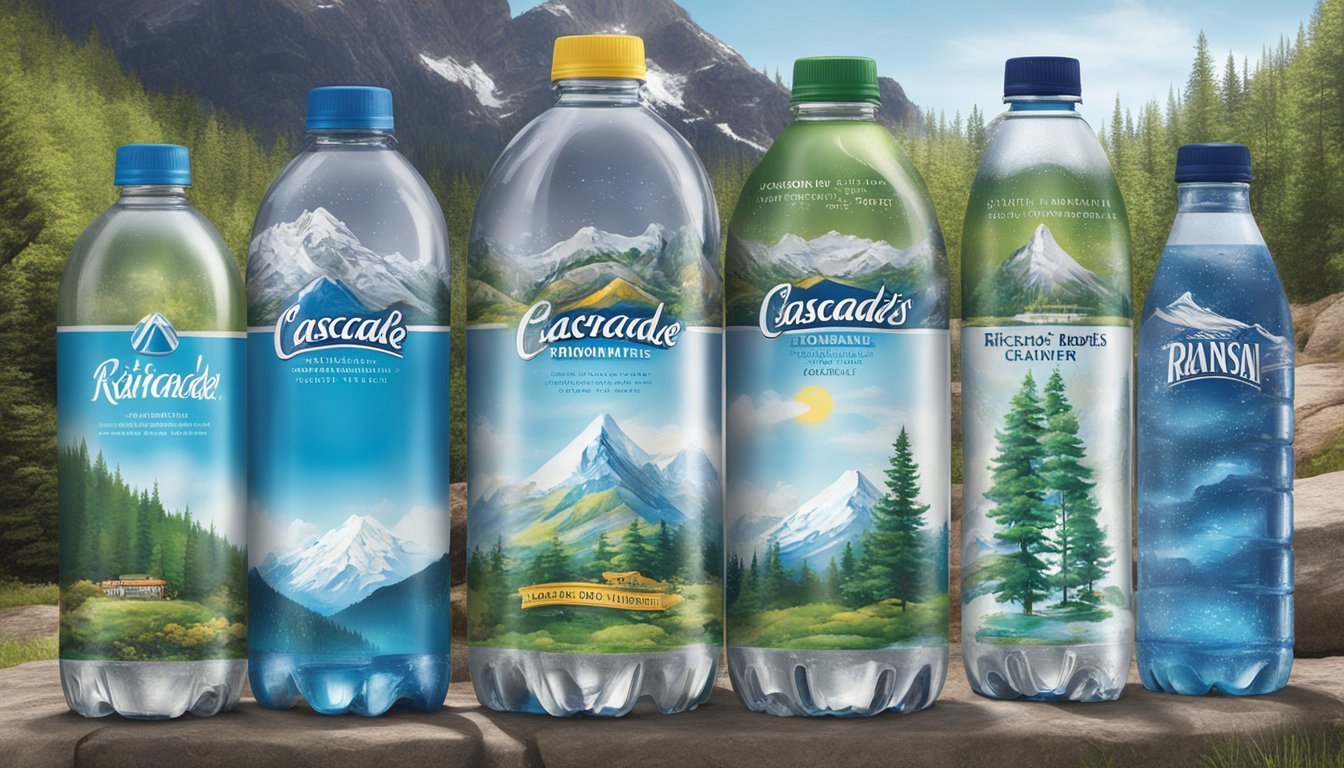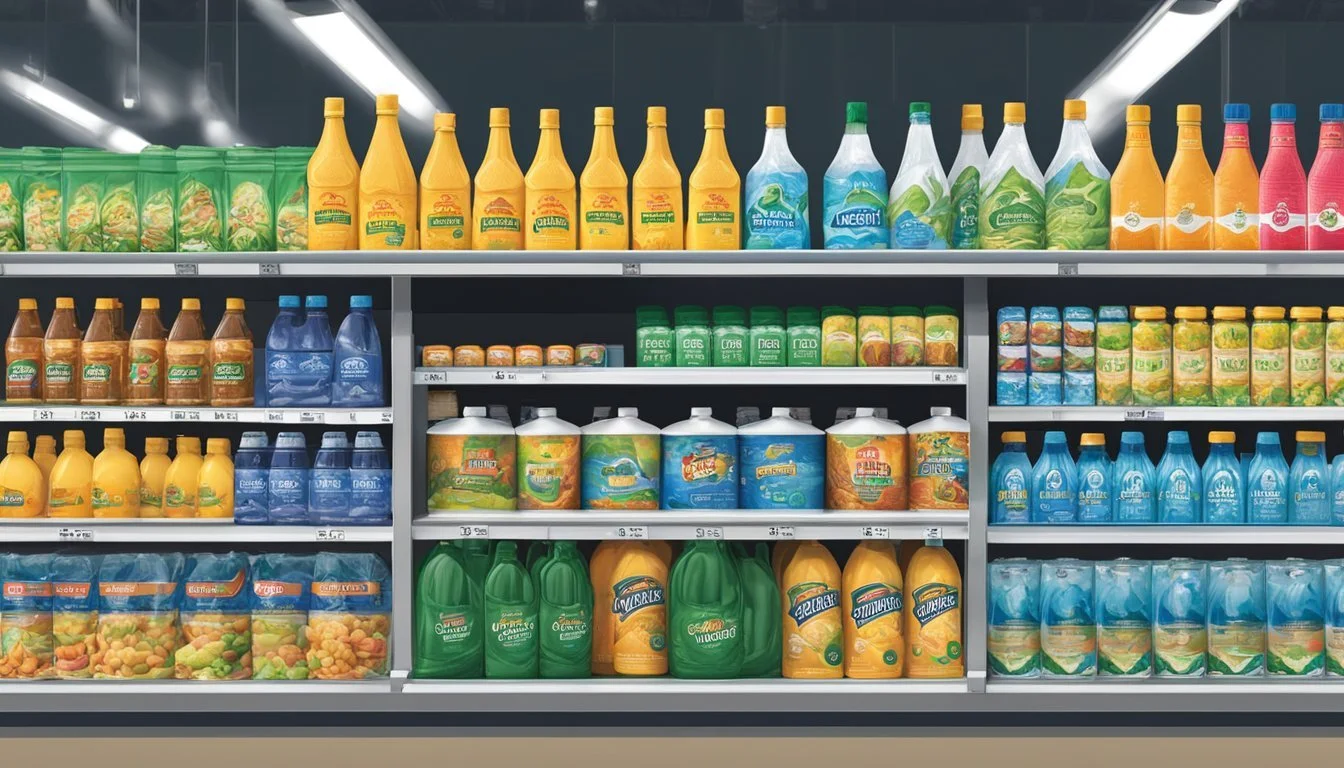Cascade Mountain vs. Richard’s Rainwater
A Comparative Review
When it comes to premium bottled water in the US, Cascade Mountain and Richard’s Rainwater stand out. These two brands not only offer unique sources but also differ significantly in taste and presentation. Cascade Mountain water, sourced from pristine springs, offers a crisp and refreshing taste that has won over many water enthusiasts.
Richard's Rainwater, on the other hand, sets itself apart by bottling collected rainwater, promising an eco-friendly option without compromising on quality. This innovative approach has garnered attention for its purity and sustainability. With sales soaring to impressive heights in 2023, Richard's Rainwater appeals to the environmentally conscious consumer looking for clean and pure hydration.
Each brand brings something unique to the table, making the choice between them a matter of personal preference and values. Whether you prioritize the mineral-rich taste of Cascade Mountain or the sustainable purity of Richard’s Rainwater, both promise a revitalizing experience. The key is to try them both and decide which aligns better with your taste and lifestyle.
Company Backgrounds
Cascade Mountain and Richard’s Rainwater have distinct roots and growth stories. These backgrounds provide insight into their market positions and operational philosophies.
History of Cascade Mountain
Cascade Mountain originated in Oregon, drawing from the pristine sources of the Cascade Range. The company has prioritized sustainability from the onset, leveraging natural spring water. Its founding was driven by a vision to offer high-quality bottled water directly from Mother Nature. The firm employs advanced filtration systems to ensure purity, making it a popular choice among eco-conscious consumers. Over the years, it has expanded its distribution network, developing a strong presence in retail chains across the United States.
Origins of Richard’s Rainwater
Richard’s Rainwater started with Richard Heinichen's innovative approach to rainwater collection in Texas. Launched in Austin, Texas, this company began by promoting the idea that rain was the purest form of water. Richard's Rainwater is notable for its partnership with Faubourg Brewing Co. and parent company Made By The Water, LLC. Utilizing a proprietary zero-waste, chlorine-free filtration system, the company ensures that collected rainwater meets strict potable standards. It markets its water in Whole Foods, Kroger, and other major retailers, emphasizing a sustainable "cloud to bottle" process.
Water Source and Collection
The sourcing and collection methods for Cascade Mountain and Richard’s Rainwater significantly affect the quality and sustainability of their bottled waters.
Cascade Mountain Spring Water
Cascade Mountain Spring Water originates from natural springs in the Cascade Mountain Range. These springs collect groundwater and are known for their purity. This renewable water source is carefully monitored to ensure the highest quality and safety standards. The springs provide a consistent flow, fed by melted snow and rainfall from the surrounding mountains, which filters through layers of rock, adding natural minerals to the water.
The collection process for Cascade Mountain Spring Water involves minimal treatment. It is transported from the springs to bottling plants where it is purified through non-invasive methods. The commitment to preserving the natural composition of the water while ensuring its potability is a key aspect of their collection strategy.
Richard's Rainwater Harvesting
Richard’s Rainwater employs a unique collection process known as “Cloud to Bottle.” It captures rainwater directly from the sky, utilizing decentralized rainwater collection sites. This approach ensures a renewable water source, as it harnesses the natural water cycle. The rainwater is collected and immediately processed using proprietary technology that filters and purifies the water to meet drinking water standards.
Richard’s Rainwater's harvesting method is highly sustainable. By collecting rainwater, the company reduces the reliance on traditional groundwater sources and minimizes its environmental footprint. The filtration system employed is virtually zero-waste, emphasizing efficiency and eco-friendliness in every drop that makes it to consumers. This innovative approach makes Richard’s Rainwater a pioneer in the bottled water industry.
Bottling and Packaging Process
Both Cascade Mountain and Richard’s Rainwater use distinct bottling and packaging approaches that impact their environmental footprint, material choices, and purification methods.
Choices of Materials
Cascade Mountain opts for glass bottles and plastic bottles, catering to varying consumer preferences. Glass offers infinitely recyclable properties, contributing to sustainable packaging efforts. Plastic bottles are lightweight but raise concerns about net-positive environmental impact due to plastic waste.
Richard's Rainwater uses aluminum cans and occasionally glass bottles. Aluminum cans, known for being infinitely recyclable, reduce overall carbon footprint when recycled properly. These choices reflect a strong commitment to conservation and supporting the planet through better materials.
Environmental Impact
Cascade Mountain’s use of glass bottles generates a smaller carbon footprint over multiple recycle cycles. Glass is heavier, which affects transportation emissions, but its sustainable nature mitigates some concerns. The inclusion of plastic bottles adds challenges, impacting their zero-waste goals.
Richard’s Rainwater emphasizes a closed loop system through aluminum cans, which significantly reduces waste. The lightweight nature of aluminum also minimizes transportation emissions. Their focus on sustainable packaging practices contributes positively to the environment. Although glass is also used, the primary reliance on aluminum marks a significant step toward better planet stewardship.
Filtration and Purification
Cascade Mountain employs an elaborate filtration system that includes removing chlorine, fluoride, and other harsh chemicals. Their purification process involves multiple stages, ensuring the delivery of clean, potable water. This aligns with providing a zero-waste and sustainable product.
Richard’s Rainwater utilizes a 7-step water purification process. Starting with pre-filtration, the water undergoes ultra-violet (UV) treatment to eliminate bacteria and viruses. The process ensures the rainwater is clean and free from contaminants. Filtering rainwater supports efforts to produce net-positive clean water solutions, reflecting their commitment to both environment and health.
In summary, Cascade Mountain and Richard’s Rainwater have distinct approaches to packaging materials, environmental impact, and purification processes. Cascade Mountain relies on glass and plastic, while Richard’s Rainwater focuses on aluminum, reinforcing their respective commitments to sustainable and clean water initiatives.
Varieties of Bottled Water
Both Cascade Mountain and Richard's Rainwater offer a range of products to cater to different consumer preferences. Understanding the available varieties will help individuals make informed choices based on their needs.
Still Water Offerings
Cascade Mountain provides high-quality still water sourced from natural springs in the Cascade Mountains. This still water is known for its purity and refreshing taste, free from contaminants that could be found in other water sources.
Richard's Rainwater collects and bottles rainwater, emphasizing the sustainability and purity of their product. The rainwater is 100% potable and undergoes a proprietary filtration process to ensure safety and taste. This process results in an eco-friendly alternative with minimal waste.
Both brands offer pure drinking water options, but Richard's Rainwater stands out for its innovative use of rain as a renewable source.
Sparkling Alternatives
Cascade Mountain has expanded its offerings to include sparkling water. Infused with natural minerals, it provides a crisp and bubbly alternative for those who enjoy carbonation.
Richard's Rainwater also provides sparkling rainwater. Using the same pure rainwater, the brand adds carbonation to deliver a refreshing and sustainable sparkling option. This product aligns with their commitment to eco-friendly practices.
Sparkling water lovers will find excellent choices from both brands, with each emphasizing purity and environmental responsibility.
Taste and Quality Comparison
Cascade Mountain offers a crisp, clean taste. Its water is sourced from natural springs, resulting in high purity.
Richard’s Rainwater, on the other hand, is harvested from rain, providing a unique, fresh flavor. This brand prides itself on capturing pure rainwater, resulting in a distinct taste that can be both refreshing and slightly sweet.
For those who value quality, both brands have their strengths. Cascade Mountain emphasizes its source from untouched mountain springs, assuring minimal contamination. Richard's Rainwater emphasizes its eco-friendly approach by collecting rainwater, ensuring a sustainable and natural water supply.
Brand Source Taste Quality Assurance Cascade Mountain Natural mountain springs Crisp, clean High purity from springs Richard’s Rainwater Harvested rainwater Fresh, slightly sweet Sustainable and natural
Cascade Mountain is also known for its subtle mineral notes, adding to its clean profile. Richard's Rainwater stands out with its exceptionally smooth texture, often praised for its unique, rain-derived essence.
Both brands maintain high standards in terms of quality assurance, ensuring that the water is subjected to rigorous testing and filtration processes to meet safety and purity standards.
In summary, for those who prefer a natural spring water with a crisp taste, Cascade Mountain is commendable. For a sustainable, fresh choice with a sweet note, Richard's Rainwater is an excellent alternative.
Branding and Market Presence
Richard’s Rainwater and Cascade Mountain stand out in the bottled water market for their unique branding strategies and strong market presence.
Market Strategies
Richard's Rainwater banks on its distinctive story of harvesting rainwater. This eco-friendly approach is a key part of its Unapologetically Distinct campaign, created with Bex Brands. The branding emphasizes sustainability and purity, targeting environmentally conscious consumers. Their packaging also mirrors this message, with minimalist designs that highlight the natural origins of the water.
Cascade Mountain differentiates itself through a brand refresh that focuses on premium quality and purity. The packaging is sleek, often featuring imagery of pristine mountains, capitalizing on the association of mountain water with cleanliness and health. Their branding efforts position them as a high-end choice, appealing to consumers looking for premium products.
Partnership and Retail Availability
Richard’s Rainwater leverages partnerships with Whole Foods Market, Sprouts Farmers Market, Natural Grocers, and various independent grocers to broaden its market reach. They also distribute through H-E-B, maximizing their footprint in the health-conscious community. This wide availability in premier stores enhances their accessibility and consumer trust.
Cascade Mountain secures its presence through deals with large retailers like Kroger and Albertsons. They also have notable placements in premier restaurants, bars, hotels, and coffee shops, enhancing their profile among higher-end clientele. This strategic retail availability ensures they maintain a robust market presence, attracting a diverse range of consumers who prioritize accessibility and luxury.
Community and Environmental Initiatives
Cascade Mountain and Richard’s Rainwater both place a significant emphasis on their community and environmental initiatives. They focus on sustainability and community partnerships to differentiate themselves in a crowded market.
Sustainability Programs
Richard's Rainwater excels in using a zero-waste, proprietary filtration system that claims to be net positive. By capturing rainwater before it reaches the ground, the company can filter and bottle it, promoting renewable sources. The approach ensures that more water is available for drinking than traditional methods. Their packaging is also sustainable, minimizing environmental impact.
Cascade Mountain, while not explicitly mentioned in the search results, is known for its efforts in sustainable packaging. They aim for 100% recyclable materials in their bottles and collaborate closely with various environmental groups to conserve natural resources.
Collaboration with Local Communities
Richard's Rainwater partners with local communities to facilitate its operations. A notable partnership is with Faubourg Brewing Co in New Orleans, Louisiana, to scale their production. They also contribute to local water needs by donating potable water.
Cascade Mountain engages with different community initiatives by supporting local conservation efforts. They work alongside environmental organizations to restore local water bodies and educate the public on water preservation. These partnerships help foster a sense of community and shared responsibility for the environment.
The Water Cycle and Conservation Efforts
Understanding the natural movement of water and the impact of bottled water on the environment is crucial for clean water and sustainability. Specific practices and technologies help address the water scarcity crisis and promote conservation.
Natural Water Cycle and Rainwater Harvesting
The water cycle involves processes where water moves through different states and locations on Earth. Evaporation, condensation, and precipitation are key parts, driven by the Sun's energy. Water vapor rises into the atmosphere, forms clouds, and returns as rain.
Rainwater harvesting captures and stores rain from roofs or other surfaces. It is used for drinking, irrigation, and other purposes. Collection sites play an essential role.
This practice helps mitigate the water scarcity crisis by providing an alternative to traditional water sources. It reduces the strain on natural water bodies and ensures clean water availability.
Bottled Water and the Environment
Bottled water production impacts the environment significantly. It involves resource-intensive processes, including extraction, packaging, and transportation. These activities contribute to water depletion and pollution.
Richard’s Rainwater collects and filters rainwater, claiming a more sustainable approach. Unlike traditional bottled water, it aims to leave a smaller environmental footprint by using a virtually zero-waste filtration system.
The emphasis on sustainability reflects an effort to conserve the planet's resources.
Consuming bottled water like Richard’s Rainwater could promote environmental consciousness and support conservation.







